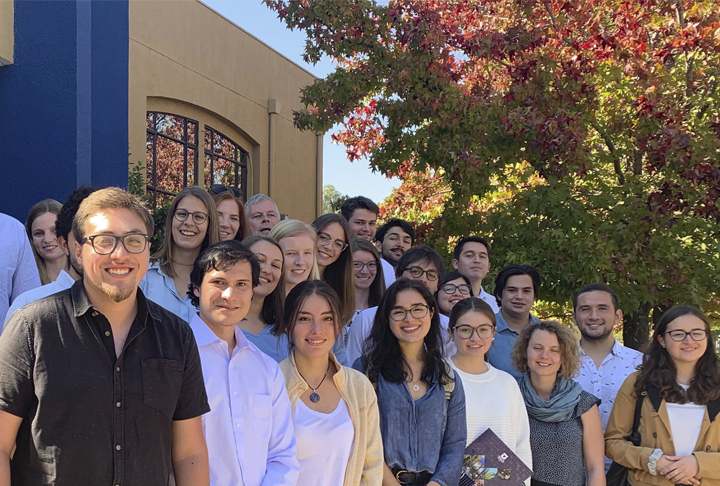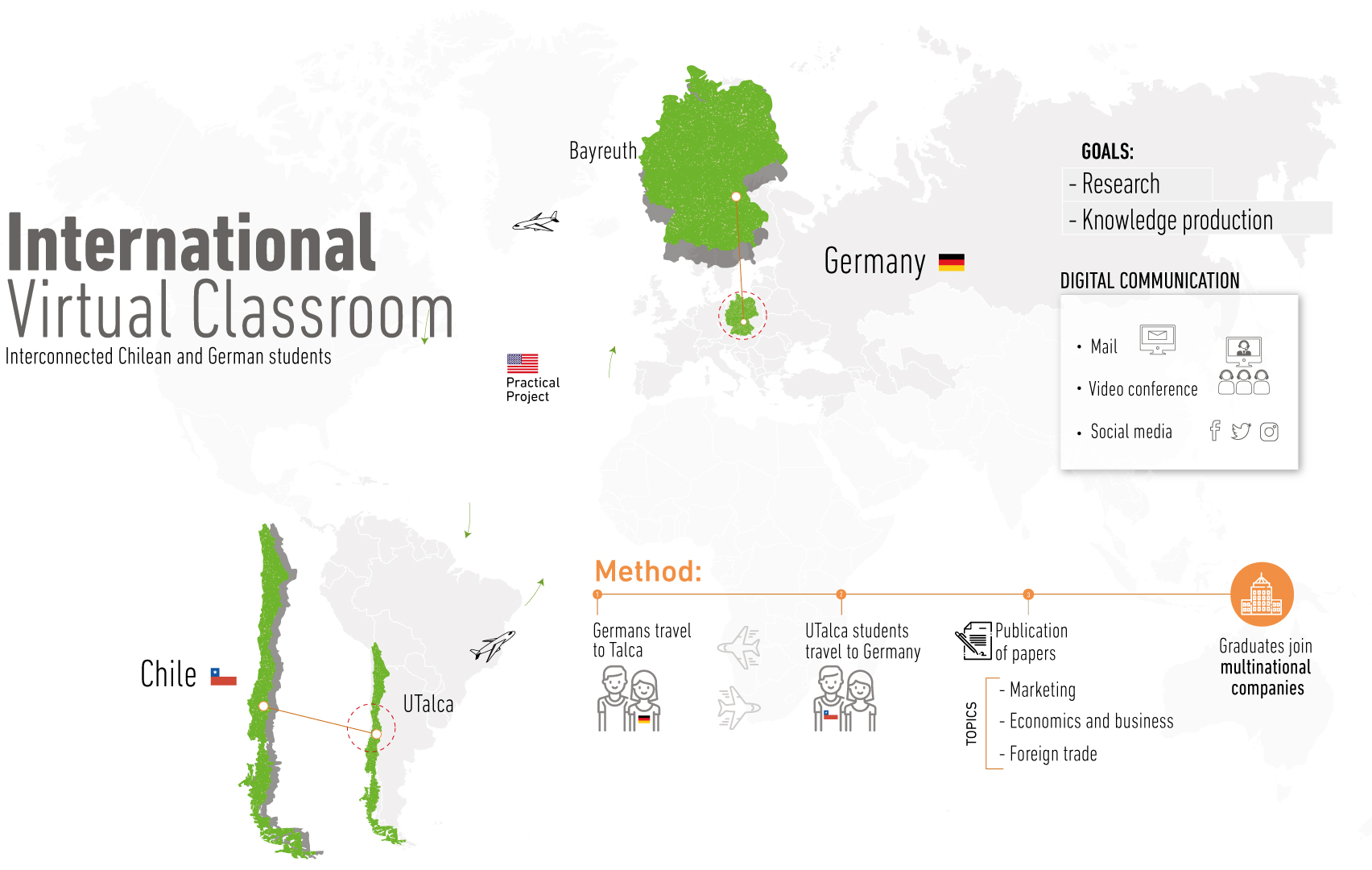Cargando 0%
Cargando 0%
Academic initiative promoted by the Department of Economics and Business of UTalca, in partnership with the University of Bayreuth (Germany), strengthens internationalization while diving deeper into student training in a globalized world.
29 Abril 2019

Universities require active international relations to face the challenges of a globalized world. Internationalization in higher education is an issue that appears constantly in the academic arena and enables improving the institution’s profile, promoting research and the production of knowledge, and strengthening the preparedness of students.
In this regard, the University of Talca has concentrated its efforts on training professionals for a globalized world through programs such as the International Virtual Classroom, an initiative created within the Department of Economics and Business (FEN by its acronym in Spanish). The purpose is to contribute to the training of Commercial Engineering students who are undergoing the final year of their study plan, through the development of a theoretical-practical project carried out jointly with other students -of the same level- from the University of Bayreuth (Germany).
The students form binational groups, each one made up of Chilean and German students, who, during an academic semester, carry out research on different aspects of the commercial relations between Chile and Germany. In order to proceed with their research, most of which is done from their respective countries, they use information technologies such as videoconferences, email, and instant messaging, among other tools, building a true Virtual Classroom.
The program -which is conducted entirely in English- also includes personal interaction among the participants. To that end, at the beginning, in April, the Bayreuth students travel to Chile. During this opportunity, the work teams are chosen, the challenges of working in a globalized world are discussed, and transnational companies are visited. At the end of the course, in July, the University of Talca students visit the German institution to hold the final presentation of their project before an academic committee.
Since the program began, in 2017, there have been a total of 75 students from the aforementioned universities participating in the three versions, with a participation of 25 students per cycle.
Among the topics researched, the main highlights are proposals related to legislation and interactions at the workplace, marketing and customer behavior, foreign investment, and commercial history between Chile and Germany.
Along with the knowledge acquired, the experience gained by the participants of this program greatly improved their employability, to the point that, after graduating, several students are now working in companies with a strong international connection.
The Rector of UTalca, Álvaro Rojas, and Patricio Sánchez, coordinator of Liaison with Europe for the Directorate of International Relations and professor of the Department of Economics and Business, are boosting this initiative, which is aligned with the strategic objective of strengthening alliances with foreign institutions for the internationalization of the University.
Rojas visited the University of Bayreuth in 2014 and later officialized the alliance with this institution located in the Franken region, north of Bavaria. The Rector left Professor Sanchez in charge of the responsibility of developing a joint academic program to strengthen the bond. Thus, the Virtual Classroom was born, a project that has been recognized by the German Embassy in Chile and the Chilean-German Chamber of Commerce and Industry (Camchal by its acronym in Spanish).
Thanks to the support obtained by the latter institution, it is expected that a book will be published covering all the research conducted by the students. It would be a useful tool for German companies wanting to invest in Chile and vice versa.
Rector Rojas said that “in this globalized, interconnected, and intercultural world, initiatives such as the Virtual Classroom are unbeatable opportunities for students who wish to broaden their knowledge and understand how research is conducted at the international level. In addition, they strengthen their training by visiting companies with a long productive tradition in both countries.”
Professor Sánchez stated that “in the future, the great difference between institutions in Chile will be the internationalization of university work, through global and intercultural integration with a focus on higher education.”
The Professor added that, in the medium term, he would like the Virtual Classroom initiative to be replicated in other Departments of the University, enriching the training of a greater number of students and strengthening the international liaisons of the institution.
Meanwhile, Rodrigo Herrera, Dean of the FEN, added that “it is extremely enriching for our students to strengthen their skills with the use of the English language, and that through the joint work with their German peers they have the possibility of becoming globalized students through technology.”
Experiences
The personal and professional satisfaction that this experience provides the students is unique. This is supported by testimonials such as that of Vicente Fernández, from the Talca Campus, who worked on a project aimed at designing a methodology to carry out an in-depth analysis of foreign investment in Chile and Germany.
“We visited Chilean companies, such as Viña Casa Donoso and Coexa, and in Germany we went to Faber Castell and the Volkswagen electric car factory. We learned about each of their processes and this was very helpful to support our projects. In addition, we visited the University of Bayreuth and we realized that UTalca does not fail in comparison to any higher education institution in the world,” Fernández stated with pride.
Fabián Castro, from the Santiago Campus, was a student of this program in its first version, in 2017, when he was responsible for carrying out a comparative analysis between labor laws in Chile and in Germany with his team. His research concluded that the factors that generate differences between both countries are cultural rather than legislative.
“It has been a great life experience, and I am still friends with my German colleagues. This course marks a before and after in my training as a Commercial Engineer and encourages me to expand towards new horizons in my profession,” said Castro.